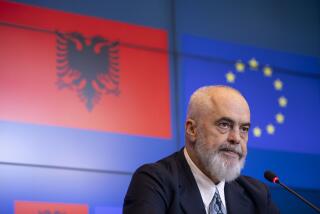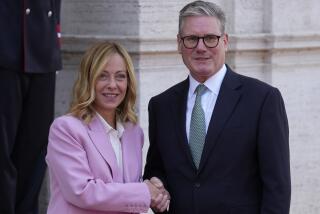Neighbors Seek to Yank Italy’s Welcome Mat for Refugees
- Share via
BADOLATO, Italy — When hundreds of Kurdish boat people landed in Italy the day after Christmas, Mayor Gerardo Manello opened this medieval town to them with a mixture of civic self-interest and humanitarian concern.
Perched on a hill overlooking the Ionian Sea, near the toe of the boot-shaped Italian peninsula, Badolato has a dwindling population of 600 residents and 300 abandoned homes. In return for helping his country cope with an influx of refugees, the mayor won a pledge from Rome to aid his impoverished community.
“We want to be a model for the world,” said the 48-year-old Communist, echoing the sentiments of Italy’s center-left leadership. “We want to send out a message that all people who are persecuted, who are in need, should be welcomed in a dignified way.”
That is not a message Europe’s other capitals want to hear.
Buffeted by a seaborne exodus of ethnic-minority Kurds from war-torn regions of Turkey and Iraq, Italy has embraced them with a warmth that has alarmed its neighbors and complicated Europe’s grand effort to erase internal barriers.
On a continent striving to be more like the United States--with common passport controls at external borders and free movement among its states--Italy’s welcome mat invites entry into more than just Italy and is often a source of discord. What many Italians view as a Kurdish flight to freedom has been branded by Germany’s top police official as a “criminally organized wave of migration.”
An uproar began when 1,221 refugees, including 862 Kurds, reached Italian ports Dec. 26 and Jan. 1 aboard two ships and President Oscar Luigi Scalfaro chose not to turn them back. Italy’s “doors must be opened,” he declared, to refugees who flee “because they are living with persecution.”
Germany and the Netherlands, fearing that the newcomers would simply pass through Italy to join established Kurdish communities on their soil, objected swiftly to what they called a blanket encouragement of unchecked immigration.
Austria, Belgium and France, which lie on the Kurds’ well-worn routes north from Italy, joined in demanding that the southern nation tighten its borders.
“All the objections raised against Italy ask a common question,” said a diplomat from Northern Europe. “ ‘How could you make such a decision on your own?’ ”
It’s a fair question. Italy is an active promoter of a common currency and other goals of European unity. Last October, Italy, along with Austria, signed the Schengen Agreement, joining seven other European Union nations--Germany, France, Belgium, Luxembourg, the Netherlands, Spain and Portugal--that agreed in 1995 to abolish passport checks at their common borders.
Under the accord, such checks are to end April 1 along Italy’s frontiers with Austria and France. But the Kurdish influx has put that plan in doubt; both neighboring countries have stepped up vigilance to keep out Kurds arriving from Italy.
“This is the first difficulty the accord has faced . . . an important test to see if this system [of no controls] works or not,” said Yves Doutriaux, a French Foreign Ministry spokesman. “If it does not work, we can reestablish the controls.”
Some politicians in Germany and the Netherlands, facing elections this year and wary of popular prejudice against immigrants, have demanded that the Schengen accord be suspended or even scrapped.
Otherwise, said Edmund Stoiber, premier of the German state of Bavaria, “we’re transferring the security of our borders to the Italians. . . . And there are certain problems whether the Italians have the same standards at their borders as we have at ours.”
In fact, they do not. Critics say the Schengen accord is unworkable precisely because the 15-nation European Union lacks a common policy toward the estimated 2 million immigrants who arrive each year--mostly from Turkey, the former Yugoslav federation, the Mideast and North Africa.
The differing approaches by Italy and Germany to the rising tide of Kurdish refugees are a case in point.
Until this year, Italy turned away most Kurds and other refugees seeking political asylum. It gave “humanitarian asylum” to 17,000 boat people from Albania last spring as their country plunged into armed chaos, then closed the door and shipped most of them home in the fall after order returned.
Still, Italy has remained the European gateway of choice for most outsiders because of its long coastline, which is difficult to patrol, and its notoriously lax expulsion procedure, which applies except during brief, periodic police crackdowns.
Instead of being put on a boat for home, most of the Kurds “expelled” from Italy have been given 15 days to leave on their own--plenty of time to slip north through the country’s porous land borders. Most have headed for Germany; just 8,000 have settled in Italy.
Germany has accepted 500,000 Kurds, more than all other European countries combined, under a liberal asylum policy. But since 1993, it has tightened up its immigration laws, denying asylum to all refugees arriving through “safe” third countries and deporting them by air to their homelands.
What sparked protests from Germany was an unexpected New Year’s shift in Italy’s restrictive asylum policy--a shift made under pressure from human rights advocates in the ruling coalition, which took power in May 1996.
With two boatloads of Kurds awaiting entry, Interior Minister Giorgio Napolitano said Italy would take a “positive attitude” toward the refugees’ asylum requests because there was “no doubt” that they suffered repression in Iraq and Turkey.
That was good news for Mirza, 21, now lodged at an abandoned schoolhouse in Badolato with 195 other Kurds. As fearful as his life in Turkey seemed, Italy would previously have denied him asylum because he was not personally singled out for persecution at home, immigration specialists say.
Mirza said he fled Turkey after being detained repeatedly at Turkish army checkpoints and consequently missing university entrance exams in Istanbul. He said he feared being dragged into the army’s 14-year conflict with Kurdish separatists.
He declined to give his surname for fear that his remarks would bring police retaliation against his parents, who have been jailed in Turkey for the past two years.
“I was ready to risk drowning to get here, because if I had stayed, I’m certain I would have soon ended up dead,” he said, clutching the black worry beads that helped him endure six harrowing days at sea on a packed cargo ship.
German officials insist that most of the Kurdish boat people are “economic refugees” and note that, if they are given Italian political asylum, they may legally come to Germany in search of jobs. Others, the officials fear, may be Kurdish separatists bent on staging terrorist attacks in Germany.
In urging a crackdown, the Germans emphasized that the refugee traffic is organized by Istanbul-based gangsters who not only charge up to $3,000 for each passenger for clandestine voyages from Turkey but also smuggle narcotics over the same routes.
At Germany’s insistence, European and Turkish police chiefs held a Jan. 8 meeting in Rome, and their pledge to fight the boat traffic has slowed it down for now. But the pressure has not altered Italy’s commitment to accept asylum-worthy Kurds who make it to shore.
Settling into a small apartment provided by the mayor and unpacking a box of donated food, Dina Marouf wondered whether she would stay here or end up in Germany.
The Kurdish economist, who fled Iraq with her brother and his pregnant wife, said they first hoped to settle with cousins in the large Kurdish community in Hamburg, Germany, “but then we fell in love with these kind, lovely Italians, who promised us political asylum and a decent place to live.”
“If I get a job here, why would I want to leave?” she asked. Looking from her balcony at the empty street of what seemed like a ghost town, she added: “If I get a job. . . .”
Boudreaux, The Times’ Rome Bureau chief, was recently on assignment in Badolato. Petra Falkenberg and Christian Retzlaff in The Times’ Berlin Bureau and Christine Winner in the Paris Bureau contributed to this report.
More to Read
Sign up for Essential California
The most important California stories and recommendations in your inbox every morning.
You may occasionally receive promotional content from the Los Angeles Times.










